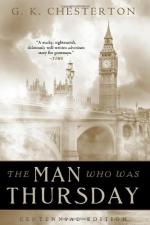|
This section contains 1,193 words (approx. 4 pages at 300 words per page) |

|
SOURCE: "The Man Who Was Thursday (1947)," in G. K Chesterton: A Half Century of Views, edited by D. J. Conlon, Oxford University Press, Oxford, 1987, pp. 72-4.
Waugh was England's leading satirical novelist of the mid-twentieth century. In such works as Vile Bodies (1930), Scoop (1938), and The Loved One (1948), he skewered such targets as the bored young sophisticates of the 1920s, the questionable values of the British press, and the American commercial trivialization of death. Considered a major Catholic author after his conversion in 1930, Waugh is best known today for his novel Brideshead Revisited (1945), which examines the lives of members of a wealthy Catholic family. In the following essay, which was originally published in The Commonweal on 21 March 1947, he notes that the circumstances of the happy ending portrayed in Chesterton's novel seem improbable to readers of the post-World War II generation.
The need for a secret society is one that...
|
This section contains 1,193 words (approx. 4 pages at 300 words per page) |

|


